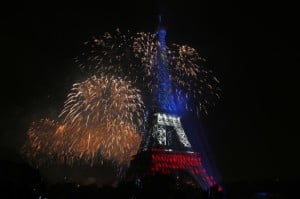France’s traditional Bastille Day military parade down the Champs-Elysees in Paris, which honors the July 14, 1789, storming of the Bastille prison that helped spark the French Revolution, this year commemorated the centenary of the start of World War I. France invited all countries that were involved on the battlefields to participate as a symbol of peace, and 76 countries were represented.
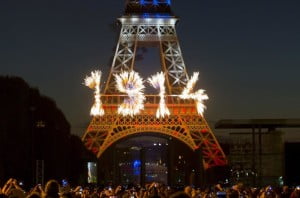
Fireworks form the date ‘1914’ to mark the 100th anniversary of the start of World War I at the Eiffel Tower during France’s Bastille Day ceremonies Monday in Paris.
PARIS — Soldiers carrying the flags of 76 countries marched Monday down the Champs-Elysees in Paris, as France’s traditional Bastille Day military parade commemorated the centenary of World War I.
France invited all countries that were involved on the battlefields — former allies and enemies, former colonizers and colonies, participating together in the ceremony as a symbol of peace.
“Ten million soldiers were killed or died of their injuries on countless battlefields. We owe them gratitude,” President Francois Hollande said in a message ahead of the march.
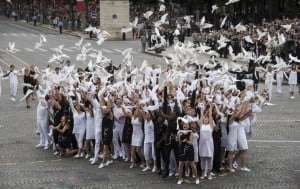
Young people from all invited countries release doves as a symbol of peace in a performance marking the 100th anniversary of the start of World War I during France’s Bastille Day celebrations.
The message took on special meaning amid renewed violence in Gaza and Iraq, and as French troops fight extremists in Africa.
MARCH OF MEMORY
Three soldiers of each of the 76 countries marched along the cobblestones in their national dress uniform.
Surrounding them were rows of French troops in sky-blue period uniforms of the “Poilus,” the name given to French infantrymen of World War I.
The ceremony echoed the first celebration of Bastille Day after the end of what was then known as “The Great War,” in 1919. “The war’s wounded were at the forefront of the parade in their wheelchairs … We celebrated the greatness of the French military by putting first the most visible victims,” recalled historian Antoine Prost.
A French army choir interpreted two popular songs of the Poilus — one telling the story of soldiers flirting with a pretty waitress in a tavern — before raising their voices in the national anthem, “La Marseillaise.”
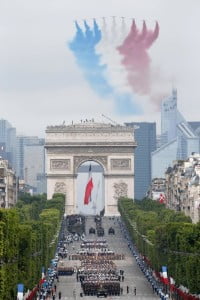
Nine alphajets from the French Air Force Patrouille de France release trails of blue, white and red smoke, the colors of French national flag, as they fly over the Champs-Elysees.
TODAY’S FRONTS
While young people from all invited countries closed Monday’s ceremony with a peace dance and a release of doves, the annual event is also about demonstrating France’s military might.
More than 3,700 soldiers, 50 aircraft, 280 military vehicles and 240 horses of the French national guard participated in the parade, which paid homage to forces serving overseas.
France currently has a strong military presence in Africa, including 3,000 soldiers in the Sahel region fighting extremists, and 2,000 in Central African Republic trying to help quell sectarian violence.
OLD WOUNDS
Among the international visitors were representatives of former French colonies, paying homage to the 600,000 colonial soldiers who served on France’s side during World War I, mainly from Algeria, Tunisia, Morocco and Senegal.
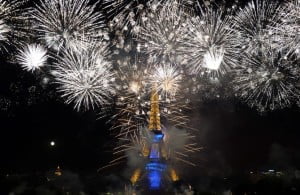
France invited all countries that were involved on the battlefields of WWI to participate in the events on Monday as a symbol of peace.
All those who lost soldiers in Europe during the war were invited, no matter what was then the status of the territories at the time, the French president’s office explained, in an effort to quash controversy over the presence of Algerian soldiers.
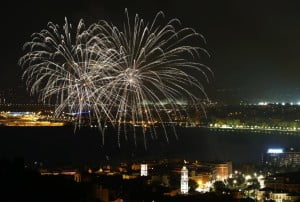
The message took on special meaning amid renewed violence in Gaza and Iraq, and as French troops fight extremists in Africa.
Some members of the French far right and Algerian independence movement objected to their presence, because memories of Algeria’s war for independence remain painful on both sides of the Mediterranean a half-century later.
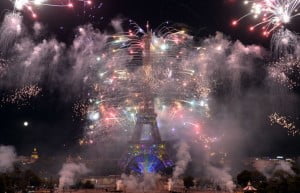
Some members of the French far right and Algerian independence movement objected to their presence in the ceremonies.
BASTILLE DAY TRADITIONS
Bastille Day marks the July 14, 1789, storming of the Bastille prison by angry Paris crowds that helped spark the French Revolution.
The French capital will enjoy a fireworks show Monday night, exceptionally fired from the Eiffel Tower. Celebrations stretch beyond French borders, with parties from New Orleans to Australia and beyond.


